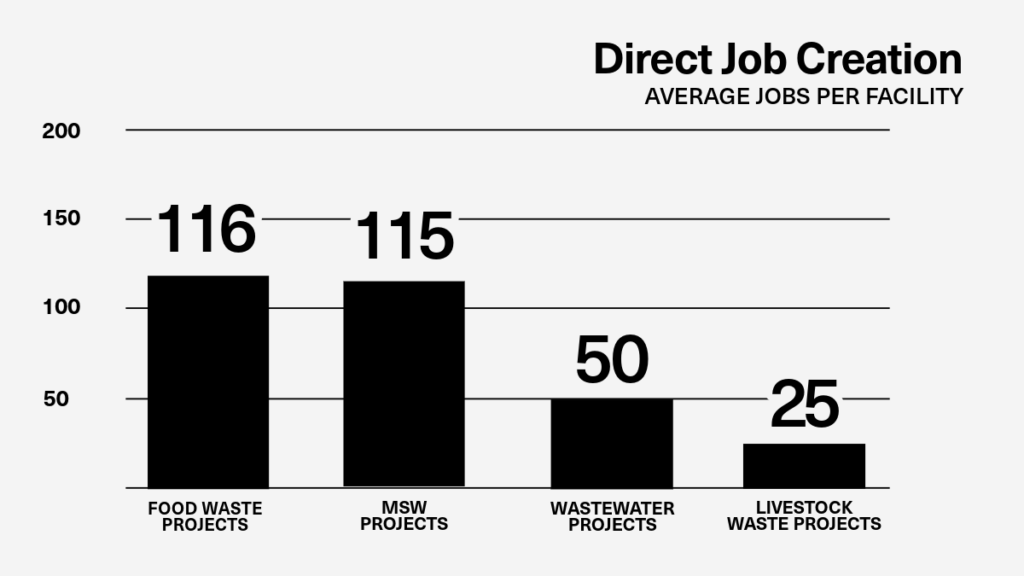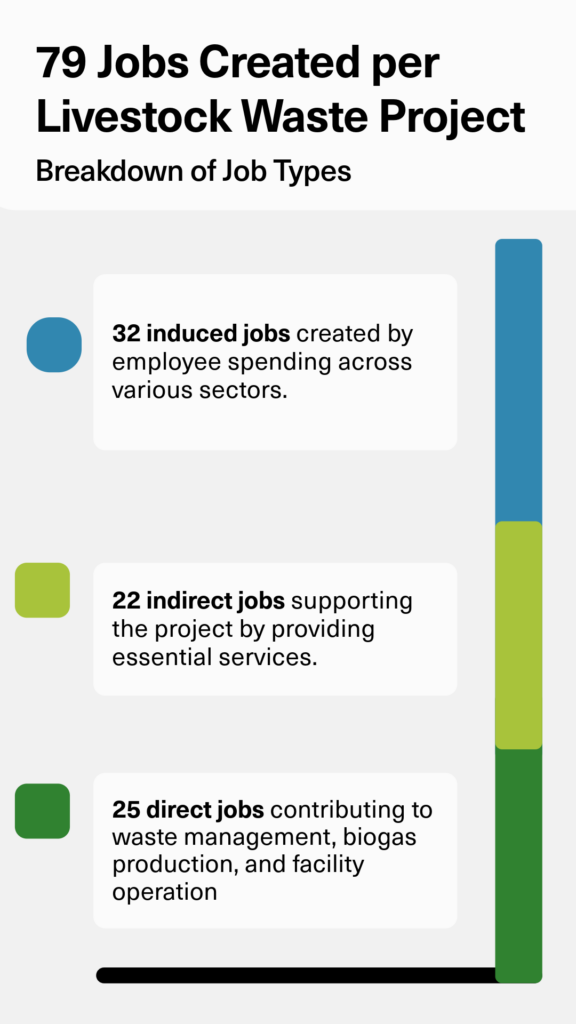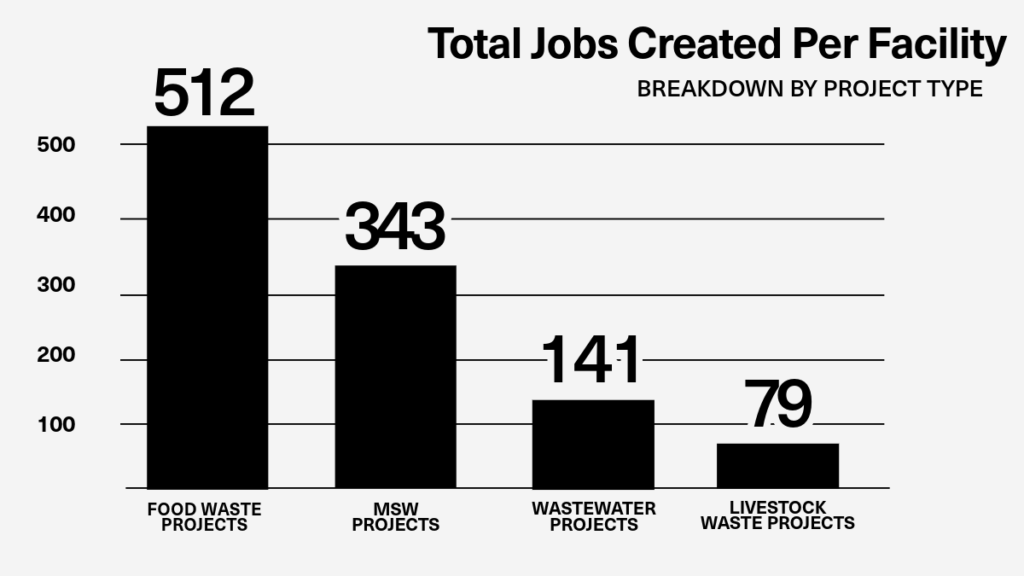While biogas facilities are recognized for renewable energy and waste reduction, their impact extends far beyond the environment. They act as economic catalysts, generating diverse, stable jobs across sectors. This article explores the types of opportunities, their volume, and their lasting community impact.
Types of Jobs Created by Anaerobic Digester Facilities
Biogas facilities act as economic catalysts, fostering diverse job opportunities that fuel local development. We’ll now examine the various employment opportunities generated by an anaerobic digester facility:
- Facility Operations and Maintenance: The core of the system demands skilled personnel for daily operations, including plant operators, technicians, engineers, mechanics, and laboratory analysts responsible for monitoring biogas production, maintaining equipment, and ensuring efficient waste processing.
- Feedstock Acquisition and Pre-treatment: Sourcing and preparing organic waste for the digester creates jobs in waste collection and transportation, including truck drivers, logistics coordinators, and waste management specialists.
- Design and Engineering: Skilled professionals in design and engineering are crucial for planning, constructing, and optimizing biogas facilities. They ensure the facility is built to safety and efficiency standards, maximizing biogas production and complying to regulations.
- Construction: Building and maintaining a large-scale facility requires a skilled workforce of construction workers, electricians, plumbers, and welders, contributing to the development of local infrastructure expertise.
- Support Services: The impact extends beyond the facility itself. Local businesses flourish by providing cleaning, security, and transportation services. Additionally, legal and accounting professionals are needed for compliance and financial management.
- Research and Development: As technology evolves, opportunities arise for researchers, scientists, and software developers to improve digester efficiency and explore new applications. This fosters innovation and attracts talent, creating a knowledge-based economy.
- Education and Training: The growing industry necessitates training programs for future employees. Local educational institutions can partner with the facility to offer specialized courses in biogas technology, waste management, and related fields, equipping individuals with valuable skills.
Biogas Employment Analysis
Biogas facilities contribute to job creation across diverse sectors. This analysis, drawing upon data from the RNG Coalition, delves into the average job creation potential associated with different types of biogas projects.
Direct Job Creation

Total Job Impact
Direct jobs within biogas facilities are important, but the full impact includes:
- Direct Jobs: These positions are located directly within the biogas facility itself. They include operational roles like plant operators and technicians, as well as specialists in areas like waste management and biogas production.
- Indirect Jobs: These jobs indirectly support the facility by providing essential goods and services. Examples include equipment suppliers, transportation companies involved in material delivery, and construction workers who initially build the facility.
- Induced Jobs: When facility employees spend their income within the wider community, they create additional job opportunities in various sectors. These “induced jobs” can be found in industries such as hospitality, retail, and transportation.
Livestock waste projects, for example, generate an average of 79 total jobs per facility:

As you can see, the impact extends far beyond just the facility itself. Here’s a comparison to other project types:

The Multiplier Effect
Biogas facilities stimulate local businesses, boost tax revenue, and contribute to overall economic development. This “multiplier effect” contributes positively to the economic growth of multiple industries, creating additional jobs beyond the facility.
Staying Power of Biogas Job Creation
Biogas facilities excel beyond their initial job creation by fostering long-term stability and resilience. Several key factors contribute to the sustainability of direct jobs within biogas facilities.
Enduring Demand for Renewable Natural Gas (RNG)
Unlike some renewable energy sources, biogas offers a “drop-in” fuel solution. It seamlessly replaces conventional natural gas in existing infrastructure, requiring no equipment changes. This inherent adaptability ensures continued demand across diverse applications.
Complementing Intermittent Renewables
Biogas demonstrates the ability to support intermittent renewable energy sources like wind and solar. Its storage and dispatch capabilities bridge the gaps during fluctuations, providing reliable, on-demand energy that strengthens the entire renewable energy ecosystem and secures the long-term viability of associated jobs.
Reliability for Mission-Critical Operations
The consistent and dependable nature of RNG proves invaluable for critical infrastructure like hospitals and universities, where even brief power outages can have catastrophic consequences. By guaranteeing an uninterrupted supply of clean energy, RNG fosters the security of these facilities and the job stability they offer.
Smooth Transition for Fossil Fuel Workers
Biogas facilities, with their technological similarities to traditional fossil fuel industries, offer meaningful career paths for previously employed workers. This smooth transition minimizes job losses and ensures a skilled workforce for the future of renewable energy.
More Than Just Green Jobs, Biogas Creates Community Prosperity
Biogas facilities act as economic catalysts, fostering diverse and stable employment opportunities across multiple sectors. From skilled plant operators to local farmers utilizing waste management solutions, these facilities contribute to a thriving job market. This impact extends beyond direct roles, generating a positive ripple effect on local businesses and tax revenue.
Several factors ensure the long-term viability of these jobs. The enduring demand for renewable gas, coupled with its irreplaceable role in specific industries, and a smooth transition for existing workers from traditional energy sectors contribute to the establishment of stable careers offering long-term security and stability. Investing in biogas goes beyond environmental benefits, representing a strategic investment in people and communities. By embracing this opportunity, communities can develop a future fueled by sustainable jobs.
